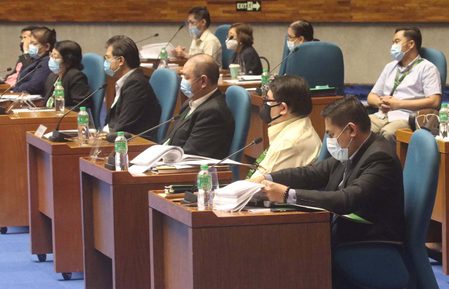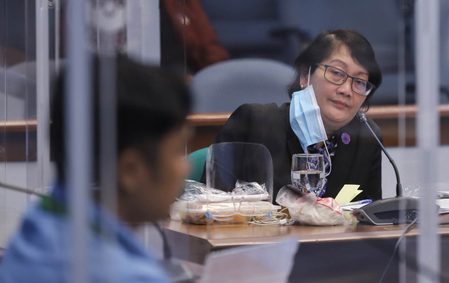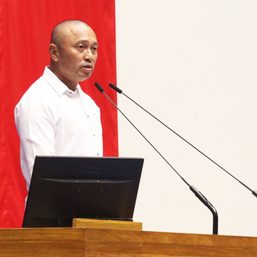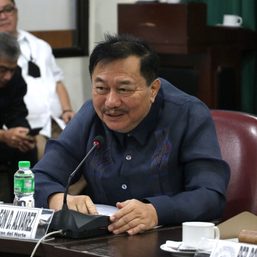SUMMARY
This is AI generated summarization, which may have errors. For context, always refer to the full article.

If the Department of Justice (DOJ) report was the sole basis, resigned Philippine Health Insurance Corporation (PhilHealth) CEO and President Ricardo Morales was the most liable for the PhilHealth frauds worth billions of taxpayers’ money.
As for Health Secretary Francisco Duque III, chairman of the PhilHealth board, he was simply “admonished.”
The DOJ said on Tuesday, September 15, that it recommended the filing of 6 complaints against Morales for his negligence:
- Section 3(e) of graft which penalizes causing undue injury to government;
- Section 3(g) of graft which penalizes contracts that are disadvantageous to the government;
- Malversation;
- Section 251 of the tax code which penalizes failure to withhold tax;
- Section 255 of the tax code which penalizes failure to supply correct information in withheld tax; and
- Section 272 of the tax code which penalizes violation of withholding tax provisions.
Of the 7 PhilHealth officials who would face complaints based on the DOJ’s findings, Morales had the most cases.
Senior Vice President (SVP) Jovita Aragona would face 4 complaints – Sections 3(a), 3(e) and 3(g) of graft and frauds against the treasury.
SVP Renato Limsiaco has 2 – Section 3(e) of graft and malversation. SVP Israel Francis Pargas and Executive Vice President (EVP) Arnel De Jesus have one complaint each under Section 3(e) of graft.
Officer-in-charge Calixto Gabuya Jr would face 3 complaints for violations of Sections 3(e) and 3(g) of graft, and frauds against treasury; while Division Chief Bobby Crisostomo has one complaint under Section 3(a) of graft.
“The task force recommended that the President strongly admonish and remind the Chairman and Members of the Board of the grave consequences of their action or inaction,” said Justice Undersecretary Markk Perete in a statement on Tuesday.
Initial findings?
Senate President Tito Sotto questioned on Tuesday why Duque was not included.
“No Duque? No Del Rosario? I’m dumbfounded! Article 217 of the Revised Penal Code is very clear. Perhaps the Ombudsman would have a better perspective of the anomalies,” said Sotto.
Sotto was referring to Philhealth Senior Vice President (SVP) for the legal sector Rodolfo Del Rosario Jr. Article 217 says any public officer who is accountable for public funds must be liable for misapporpriation.
Asked to respond, Justice Secretary Menardo Guevarra said “our report is about our initial findings only. Further investigations will be conducted and more people may be charged.”
Pressed to elaborate, Guevarra said that the further investigations will be done by “composite teams” which are composed of representatives from other agencies including the DOJ, but the task force itself is done with its probe.
“Technically, the task force itself has become functus officio, but the member agencies have agreed to continue investigating in a coordinated manner, focusing on specific targets,” Guevarra said. Functus officio means the mandate has expired.
Asked if the report is already the final report by the DOJ task force, Guevarra said, “Yes, unless the task force is extended or further directed by the President to continue.”
Guevarra was unable to estimate how much of the overall issues in Philhealth the task force report was able to cover, saying it’s “hard to assess.”
The question was asked to Guevarra to manage public expectations of what other frauds other investigations could uncover, and if more people would indeed file complaints.
“The teams may decide to extend their investigations to incidents that happened years back. The pool of alleged irregularities is not completely known at this time,” said Guevarra.
Perete added that complaints against hospital and clinic heads, who were revealed in Senate investigations to be claiming reimbursements illegally, might be part of the investigation of the composite teams.
“Investigation of composite teams are ongoing, that’s one of the issues they’re looking at,” said Perete.
Complaints would be filed either before the DOJ or Office of the Ombudsman “depending on the crime committed and/or the rank of the respondent,” said Perete.
The DOJ-led investigation was ordered by President Rodrigo Duterte in an August 7 memorandum, under which other relevant agencies could participate, giving rise to questions on jurisdictional authority of the DOJ as opposed to the Office of the Ombudsman.
The Office of the Ombudsman is mandated to investigate and prosecute erring public officials.
DOJ report: Negligence
The DOJ Task Force found that the ultimate sin of the officials was negligence.
“The Task Force concluded that the totality of the evidence supports the reasonable conclusion that wrongful acts or omissions on the part of certain key corporate officers of PhilHealth have been committed,” said Perete, adding that these lapses warranted the filing of the complaints.
The DOJ did not release its 177-page report because “it contains information on ongoing investigations by member-agencies,” said Perete.
Without specifying the officials involved in particular frauds, the DOJ gave some details in a press release on Tuesday.
PhilHealth’s Executive Committee and the Board, the DOJ said, were negligent in the implementation of the controversial Interim Reimbursement Mechanism (IRM).
IRM was a system of giving hospitals and clinics cash to use during “fortuitous events,” like a pandemic, because PhilHealth owed them huge sums in perennially delayed reimbursements.
Senate investigations have found that by June 9, PhilHealth had released more than P14 billion under the IRM to different hospitals and clinics all over the country – when the implementing circular only made the IRM effective on June 11.
The DOJ also found that because of the negligence, “the IRM was implemented without sufficient standards and guidelines, making fund releases susceptible to abuse; and IRM Fund releases were made despite the absence of mechanisms to monitor fund utilization and liquidation, and without taxes due thereon being withheld.”
The non-withholding of taxes became the basis for the tax complaints against Morales.
At the Senate, it was Limsiaco who was grilled for this as the SVP for fund management. Limsiaco initially said he didn’t know IRM was subject to withholding tax, but retracted upon pressure and said he left it to the hospitals to return the withholding tax.
The DOJ did not recommend the filing of any tax complaints against Limsiaco.
IT procurement
The DOJ also said “members of the Executive Committee purposely withheld” important documents and audits to move technology procurements that were overpriced by P730 million.
“A request for budget worth over P730M was made which were not included in the corporation’s Information System Strategic Plan as required by law. An Internal Audit Report that detailed major discrepancies or inconsistencies in the inventory of the corporation’s hardware and software, and in the appraisal of certain documents supporting its ICT expenditures was also not presented to the Board,” said the DOJ.
At the Senate, it was Morales’ head executive assistant Etrobal Laborte who gave leads to the investigation that revealed PhilHealth was going to buy 15 network switches at prices so much higher than current market prices.
The Commission on Audit (COA) had also flagged PhilHealth for the procurement itself, saying that there were 24 brand new units of the same item still unused and still in their boxes.
“The Task Force found that members of the Executive Committee purposely withheld the presentation of important information or audit documents in order to obtain the Board’s approval on their requested budget allocations to procure certain ICT equipment,” said the DOJ.
Morales as former president and CEO was part of both the Board and the Executive Committee. – Rappler.com
Add a comment
How does this make you feel?







There are no comments yet. Add your comment to start the conversation.